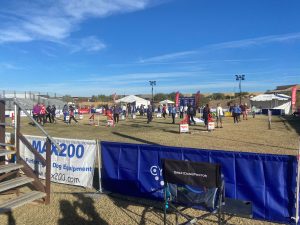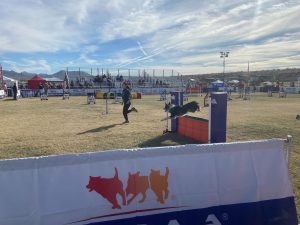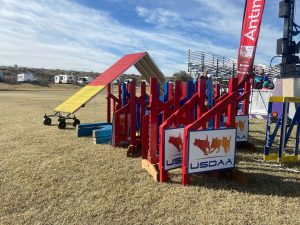- Slug: Sports-Dog Agility Games. 860 words.
- 3 photos available
By Nicholas Hodell
Cronkite News
SCOTTSDALE – The beginning of December began with healthy athletic competition at WestWorld of Scottsdale among four-legged furry friends.
The Cynosport Dog Agility World Games took over the facility’s outdoor fields over four days starting last Thursday for the premier event in the United States Dog Agility Association’s championship season, which featured agility courses with obstacles such as weave poles, tunnels and seesaws. Errors committed during the course earned faults, which in addition to going in the wrong direction, could lead to elimination.
The event marked the culmination of the canine sport’s rise since its first introduction in the late 1970s in England. Dog agility did not take off in North America until the USDAA began its premier event, the Grand Prix of Dog Agility World Championships, in 1988.
The USDAA introduced other events – the Dog Agility Steeplechase in 1996 and the Masters Challenge Biathlon in 2011 – over the years to form today’s Cynosport World Games.
While dogs are the stars of the sport, their human companions are as important as the competitors themselves. Handlers like Billie Rosen and Karen Gloor guide their dogs through the course with hand gestures, verbal commands and encouragement.
A dog’s preparation to perform on the big stage starts at a young age. Training continues throughout the dog’s early months to get them ready for future competition. Most venues have age limits of 15 months, according to Gloor.
“When we first get them home, we start doing just basic, foundational (training),” Gloor said. “There’s no agility of obstacles or equipment involved. It’s just a lot of coming to hand or just basic on-the-ground things.”
On the day of an event, the handlers walk through the course before their runs with attention to detail.
“You have to learn the course and you have to get some muscle memory, so you need to train your body and your mind to run the correct course,” Rosen said. “So people use their arms out as a way of helping their body remember the course that they need to run.”
Arizona has turned into a hot market for the sport, thanks in part to the contributions of Gloor and Rosen, who earned places in the USDAA Hall of Fame Class of 2022 in the Pioneers of Dog Agility category.
Gloor has been in the sport for over 25 years. She served in many roles for the USDAA, working as a judge, trial secretary and course reviewer before a recent term on the USDAA Advisory Board.
Rosen has been around dog agility since the early 1990s. She was a critical piece in the founding of the Jumping Chollas Agility Club in 1994 as the club’s first training director and show chair. She has won Lifetime Achievement Awards with several of the eight dogs she has competed with in USDAA competitions.
Both said they were surprised to receive the honor.
“It means that what I have been doing over the years has really made a difference, and I appreciate that,” Gloor said. “I think it’s great.”
“You give to the sport, you get a lot back from the sport and you never expect to get an award for that,” Rosen said. “That’s just part of the fun.”
Rosen also said she has trained around 12 to 15 dogs for competition in her career and makes no secret about her preferred breed.
“Originally, I had Miniature Schnauzers and in the late 1990s, I discovered Border Terriers,” Rosen said. “They won my heart and that’s what I’ve had ever since.”
Gloor said different breeds have gained popularity as the sport evolved from a fun competition to competing with prize money at stake.
“As people started getting a little more serious, you saw the herding breeds get involved in the sport,” Gloor said. “Now, all of a sudden, Border Collies became quite popular. (It’s) sport breeds like I have. It’s evolved into more people picking and choosing the types of dogs they want to compete with versus competing with the dogs they had in their house.”
Gloor and Rosen have both seen dog agility grow exponentially in their decades of combined experience in the sport. The sport has excelled particularly in Arizona, according to Gloor, because people want to foster a more serious relationship with their dogs.
“This venue has a pretty good stranglehold in this part of the country,” Gloor said. “I think people just really want to form a connection with their dog and do something fun with their dog and agility fills all of those needs.”
That has led Arizona to become one of two rotating hosts for the Cynosport World Games, along with Murfreesboro, Tennessee, where the event will be held next year. It took years, though, for the event to end up in a good rotating agreement between the two locations to attract competitors from throughout the United States.
“It evolved into that because it was hard to find a good spot that was good for both groups of people,” Gloor said.
The Cynosport Dog Agility World Games marked the end of the 2022 USDAA championship season, but next season is not far away. Tucson will host the first USDAA regional championship of 2023 from Jan. 20-22.
For more stories from Cronkite News, visit cronkitenews.azpbs.org.


